Artificial intelligence (AI) has become an integral piece of almost any industry. From fraud prevention to tumor recognition, automating business processes, and so much more. The capabilities of AI continue to expand along with the development of new technology and systems.
As the digital era continues to evolve, we’re finding more ways to utilize AI for both personal and business matters. Take the famous Amazon Alexa, for example, which does anything from making personalized recommendations for music and movies to coordinating your dinner reservations.
Can you think of all the ways you use AI in your day-to-day life? Chances are, you’re using it in more ways than one and may not realize it.
From facial recognition in our phones to Grammarly suggestions in emails, AI is everywhere, and it continues to grow.
The business world is no exception. According to Entrepreneur, about 80% of businesses are said to be investing in AI development services. Meanwhile, another 47% are working on incorporating AI into their business strategies. Ultimately, it’s estimated that a whopping $2.9 trillion will soon be added to corporate value through AI.

How is AI used in software development?
In the nearest future, AI in software development can help streamline processes, thus boosting developers’ productivity, speed, and the quality of their work. These processes can include project planning, estimation, quality testing, and the user experience.
A prime example of AI increasing productivity among software teams is programming assistants like Kite, which help developers write code in any language, regardless of proficiency. By accessing libraries and leveraging AI-based syntax capabilities, these solutions help teams code faster and ensure that it’s error-free. As a result, developers can focus their work on other, more demanding tasks.
Furthermore, AI in application development allows developers to quickly prioritize tasks and take out any unessential work, thus making strategic decisions better and more efficient.
We’ve broken down some of the key benefits of AI-powered software development below:
1. Project Management
AI can make a world of difference in project management for organizations. This may be attributed to its ability to quickly assess data and make relevant predictions.
Such solutions help project managers monitor and ensure accuracy within projects and tasks. It also enables them to boost their productivity and focus by automating repeated processes.
Because AI is structured to sift through large amounts of data quickly and efficiently, it is especially useful for managing in-depth projects. Especially as it can also quickly identify weak areas within projects and nudge relevant team members. For instance, if AI detects a skills gap on a project, it can let relevant people know that an extra pair of hands or expertise are needed.
2. Quality analysis and code review
Another perk of Artificial Intelligence in software engineering is that it can assess quality concerns and identify bugs before a piece of code is transferred from staging to a production environment. This not only reduces the time required by developers but also helps to support the release of a polished product.
3. Identifying errors
Human errors can potentially cost businesses thousands of dollars (or more). That being said, it makes sense to consider a program that greatly reduces the risk of errors.
Developers and QA specialists can safely rely on AI in this matter. Even slight deviations from standard protocol can trigger warnings from an AI program.
Furthermore, when an error is found, the appropriate software development team gets notified and can quickly address the problem.
As you may know by now, AI-powered software development is incredibly useful, but it needs to be used appropriately. It’s important to keep in mind that AI recommendations should only be utilized by your team if they make sense to implement.

When considering an AI program, pay close attention to its features and keep your target budget in mind. You do not want to implement a system just for the sake of having it, as it could cause a big headache in the long run, with little-to-no added benefits.
It’s essential to know that not all industries (and even not all companies within a certain industry!) will find that AI in application development will be beneficial to them, as it can be quite costly to run systems. Furthermore, many AI applications require lots of data to run accurately and efficiently, and algorithms can take some time to establish.
Read also: Mistakes of AI adoption: lack of data strategy
Benefits of AI in software development
Traditional development tools still require developers to go in and manually enter and update data. This can become a burdensome task for developers as they deal with multiple dependencies, integrations, interfaces, etc. One primary purpose of AI-powered software development is to step in and automate these processes.
It’s natural for humans to get overwhelmed and feel overloaded when provided with large amounts of data, which commonly leads to errors. Therefore, AI is optimal for repetitive, tedious tasks or even those that may get overlooked by the human eye.
Assessments, particularly ones that are time-sensitive or to financial matters, are another area that can be improved by AI. Let your team focus on the areas that require their full attention, skill, and capabilities by allowing AI to take over certain tasks.
Read also: AI in business: What are the benefits of artificial intelligence?
Examples of using AI in software development
Real-world examples and use cases of AI are abundant, and it’s important to identify exactly where AI can assist. We’ve outlined some of the most popular use cases below.
AlphaCode, DeepCoder – AI writing working code
DeepCoder was designed by Microsoft and Cambridge University to write code. It does this by sifting through a large code database and producing its own.
While the expansion of DeepCoders capabilities is expected in the future, it is currently limited to programs containing five lines of code.
In comparison, AlphaCode writes computer programs and ranks among 54% of participants in programming competitions. It is, however, only as accurate as the data fed to it through its training programs to produce solutions, which is something a human could easily work around regardless of their familiarity with a specific subject.
Google software engineer, Petr Mitrichev, actively involved with coding competitions, stated, “Solving competitive programming problems is a really hard thing to do, requiring both good coding skills and problem-solving creativity in humans. I was very impressed that AlphaCode could make progress in this area and excited to see how the model uses its statement understanding to produce code and guide its random exploration to create solutions.”

Diffblue – unit tests automation
Developed by the University of Oxford’s Computer Science department, this tool uses AI to make unit tests for code.
Since unit testing is essential for programmers, this product should be found as a saving grace for many, as prior products have been limited to commercial enterprises only.
These tests are completed in seconds with minimal effort from users.
Diffblue uses unsupervised learning to construct unit tests. Diffblue CEO, Matthew Lodge, compares it to other programs stating, “What we’re doing is unique in the sense that there have been tools before that use what’s called static analysis.” He continues, “They look at the program, and they basically understand the path through the program and try to work backward from the path. So, if the path gets to this point, what inputs do we need to put into the program in order to get here?” Diffblue’s goal is to ultimately go around certain limitations.
Microsoft’s Visual Studio IntelliCode – AI-assisted development
IntelliCode allows developers to increase productivity by making recommendations based on prior entries. Subsequently, the more a developer uses this AI-assisted program, the more accurate it becomes.
Microsoft describes these recommendations as being based upon thousands of projects within Github that have over 100 stars.
Another feature of Intellicode includes argument recommendations, which can be generated rather quickly.
Project estimations in AI-powered software development
Although AI can prove to be highly useful, it is far from simple, as accurate predictions can be difficult to obtain. As previously mentioned, many programs require a large amount of data to run accurately, and it can take a while to get algorithms established effectively.
Because certain aspects of software projects may change, such as requirements, user feedback, etc., accuracy can be thrown off.
Software projects can also vary widely regarding cost, duration, and other factors, so there is no set guideline for managing these projects. Because of this, many projects rely solely on a person’s familiarity with software development.
Read also: Cost of AI in the healthcare industry
What is the importance of AI in software engineering?
Artificial intelligence in software engineering continues to evolve and greatly assists programmers. Although it does take some adjusting, it has proven to be quickly adaptable.
The use of algorithms is transforming development processes, making the industry faster, more reliable, and more productive. Every step of the way, AI-based technologies are with developers leading them to greater heights than ever imagined.

Future developments for artificial intelligence in software engineering should prove to be even bigger and better and further optimize the way developers work.
AI in software engineering can be useful for:
- Gathering requirements – a task that currently takes a lot of manpower to accomplish. With certain AI technologies such as Google ML Kit and Infosys Nia, processes can be somewhat simplified for humans. It is important to note that, at the current stage of AI in software engineering, it is imperative to have clearly defined goals within your business and not rely solely on AI for successful development.
- Providing automation for testing – these are provided through several different tools responsible for producing test cases and carrying out regression analysis.
- Prototype Speed – Going through the motions of developing a prototype takes careful planning and conscientious efforts. Not only that but there’s also a ton of documentation involved to remain compliant with business regulations. Through pattern tracking, these efforts can be condensed timewise.
With all of the use cases mentioned above, it’s essential to understand that AI-powered tools can’t replace humans or fully take over whole processes, such as gathering requirements mentioned above or prototype building. It acts rather as a much-needed assistant and the perfect supplement to human know-how and experience.
AI provides team assistance, not replacements
While AI is changing software development in a way that we have never seen before, it is important to keep in mind that AI should not be seen as a replacement for your human software development team, as algorithms still have a ton of room for improvement. In fact, it’s estimated that there will actually be a greater need for developers soon as AI in application development continues to expand.
Instead of seeing AI in application development as a way to replace personnel, it should be viewed to reformulate job roles. AI will certainly be able to take over certain mundane tasks, but human intervention will inevitably be needed for things such as oversight and machine running.
AI in software development – summary
The bottom line is that, although AI has offered promising results and opened the door to many possibilities, companies should carefully consider if it’s the right option for them and in what capacity. Artificial intelligence in software engineering is an incredibly powerful tool that can enable and empower businesses when applied correctly. Just like in the case of implementing AI in any other area of your business, it needs to start with a strategy. Only then can it support your goals and help you succeed.
